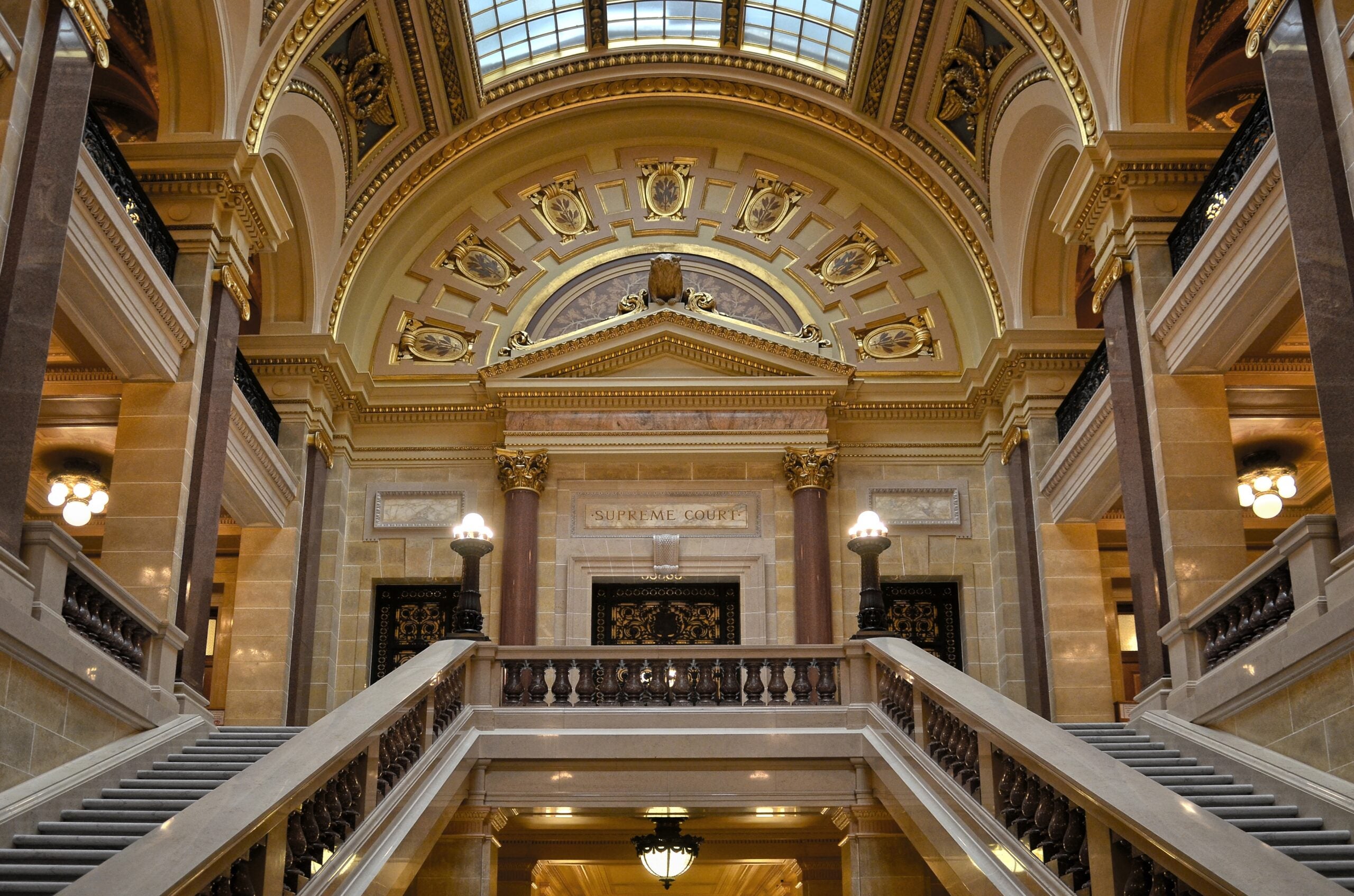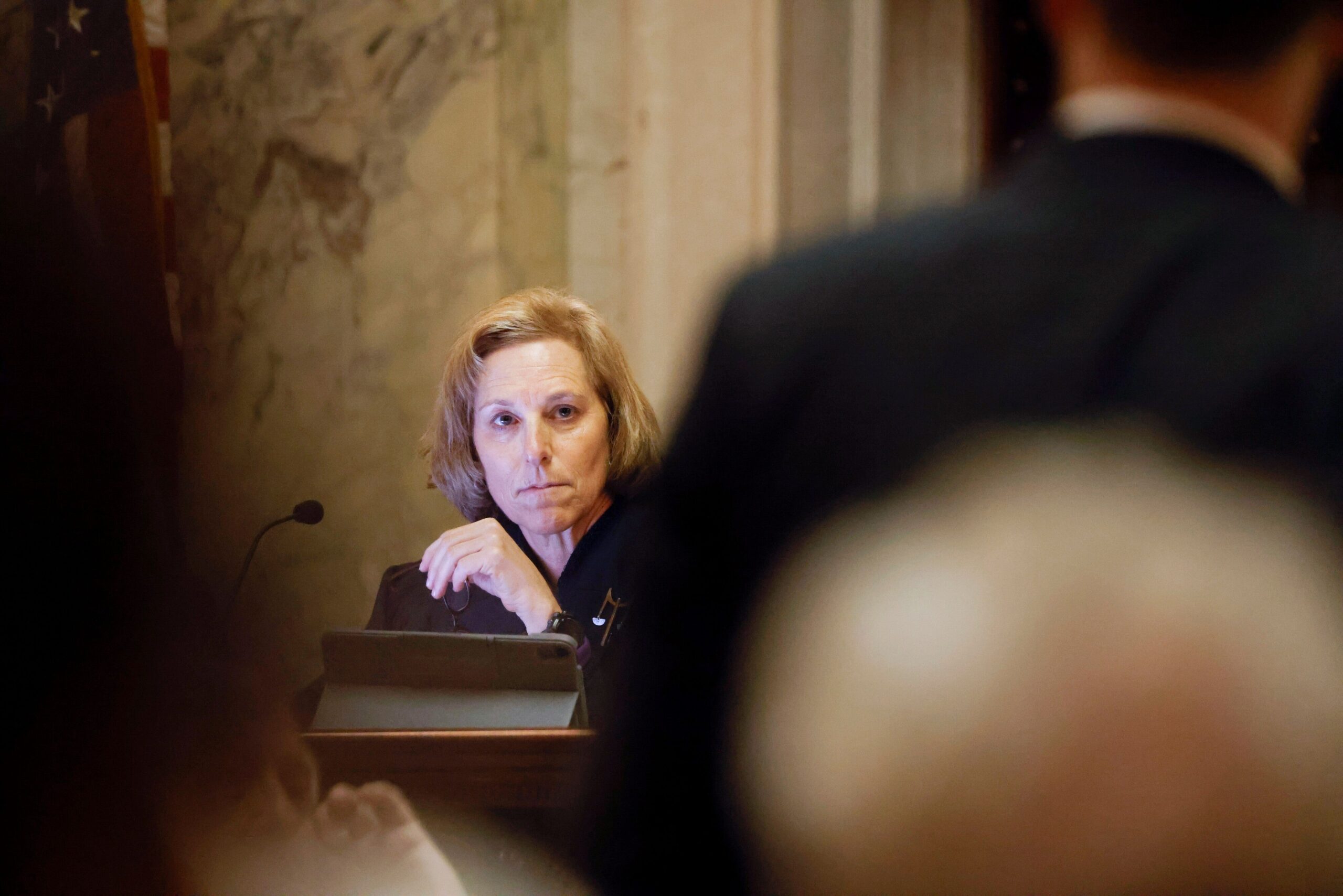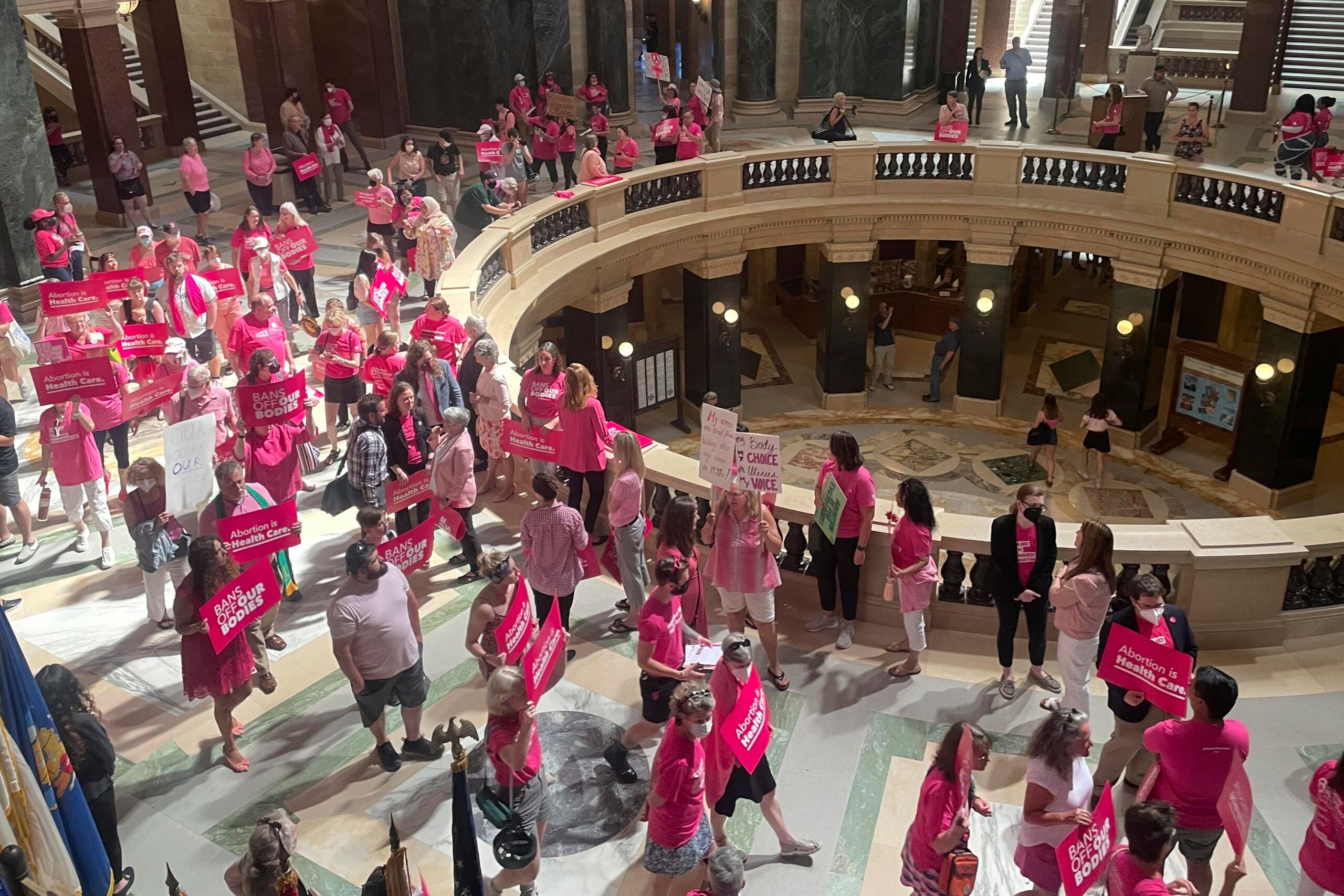Conservative-backed state Supreme Court Justice Daniel Kelly faced his two challengers in a debate for the first time on Tuesday and often found himself playing defense against attacks on his partisan ties and judicial philosophy.
Kelly, who was appointed by former Gov. Scott Walker in 2016, faced liberal-backed candidates Jill Karofsky, a Dane County judge, and Marquette University law professor Ed Fallone in a debate hosted by the American Constitution Society in Madison.
Karofsky was quick to accuse Kelly of having a partisan bias on the bench.
News with a little more humanity
WPR’s “Wisconsin Today” newsletter keeps you connected to the state you love without feeling overwhelmed. No paywall. No agenda. No corporate filter.
“Your record is the record of someone who makes decisions based on what your political values are,” she said. “I find it amazing that we have a justice on the Supreme Court who has been supported by right-wing special interests, who has continued to receive the support of those groups and every single time when he’s made a decision on the Supreme Court, he has made that decision in favor of those exact same groups. I don’t know how it’s possible that the law could always be on their side.”
Kelly pushed back, saying he keeps his personal political beliefs separate from his rulings.
“I don’t judge the result of a case according to a political lens, I judge it according to what the law requires,” he said.
[[{“fid”:”1086431″,”view_mode”:”full_width”,”fields”:{“format”:”full_width”,”alignment”:””,”field_image_caption[und][0][value]”:”%3Cp%3EWisconsin%20Supreme%20Court%20candidates%26nbsp%3BEd%20Fallone%2C%20incumbent%20Daniel%20Kelly%20and%26nbsp%3BJill%20Karofsky%20participated%20in%20a%20debate%20on%20Tuesday%2C%20Nov.%2019%2C%202019.%20%3Cem%3ELaurel%20White%2FWPR%3C%2Fem%3E%3C%2Fp%3E%0A”,”field_image_caption[und][0][format]”:”full_html”,”field_file_image_alt_text[und][0][value]”:”Wisconsin Supreme Court candidates Ed Fallone, Daniel Kelly and Jill Karofsky”,”field_file_image_title_text[und][0][value]”:”Wisconsin Supreme Court candidates Ed Fallone, Daniel Kelly and Jill Karofsky”},”type”:”media”,”field_deltas”:{“1”:{“format”:”full_width”,”alignment”:””,”field_image_caption[und][0][value]”:”%3Cp%3EWisconsin%20Supreme%20Court%20candidates%26nbsp%3BEd%20Fallone%2C%20incumbent%20Daniel%20Kelly%20and%26nbsp%3BJill%20Karofsky%20participated%20in%20a%20debate%20on%20Tuesday%2C%20Nov.%2019%2C%202019.%20%3Cem%3ELaurel%20White%2FWPR%3C%2Fem%3E%3C%2Fp%3E%0A”,”field_image_caption[und][0][format]”:”full_html”,”field_file_image_alt_text[und][0][value]”:”Wisconsin Supreme Court candidates Ed Fallone, Daniel Kelly and Jill Karofsky”,”field_file_image_title_text[und][0][value]”:”Wisconsin Supreme Court candidates Ed Fallone, Daniel Kelly and Jill Karofsky”}},”link_text”:false,”attributes”:{“alt”:”Wisconsin Supreme Court candidates Ed Fallone, Daniel Kelly and Jill Karofsky”,”title”:”Wisconsin Supreme Court candidates Ed Fallone, Daniel Kelly and Jill Karofsky”,”class”:”media-element file-full-width”,”data-delta”:”1″}}]]
Kelly is seeking a full, 10-year term on the court, while Karofsky and Fallone are hoping to shift the court’s 5-2 conservative majority back toward liberals. If a liberal-backed candidate wins this race, the balance of the court could be flipped in 2023.
The state Supreme Court has taken up a number of high-profile cases in recent years, including challenges to last year’s lame-duck session of the state Legislature that took power away from Gov. Tony Evers and Attorney General Josh Kaul. The court may also play a role in how Wisconsin’s next set of legislative maps are drawn after the 2020 census.
Fallone also criticized Kelly for his work on the bench, saying the justice has ruled too often to overturn legal precedent.
“The problem with Justice Kelly on the court is that he is an ideologue,” Fallone said, accusing Kelly of believing himself to be a “one-man constitutional convention.”
“I’m not not accusing (Kelly) of making decisions based on partisan political motives. I think the danger is he reaches out to decide constitutional questions unnecessarily, because he believes it’s his role on the court to remake our constitutional law and overturn precedent that he believes was decided incorrectly,” Fallone said. “I, in contrast, believe it’s the duty of our state Supreme Court to act modestly and with humility.”
Kelly countered that “sometimes the court gets it wrong and it’s important that we say so when that happens.”
The candidates also clashed over who has the best professional experience for the job. Karofsky argued her time as a Dane County Circuit Court judge has prepared her best.
“Unlike my opponents, I’m in a courtroom every single day,” she said.
Fallone pointed out he would be the first Latino justice on the state’s highest court. He argued the court should represent the people of Wisconsin.
“The question should be not who claims to be fair, we all do, who claims to be independent, we all do, but who has the perspective and the experience that can make a difference,” he said.
Kelly said his broad swath of professional experience, from working as a litigator to a special prosecutor and criminal defense attorney, equipped him best.
“There is a breadth of experience I have that cannot be matched by my opponents,” Kelly said.
Prior to his appointment, Kelly worked as a private attorney in Waukesha. According to his firm’s website, Kelly’s practice included elections and campaign finance litigation, as well as defense of government organizations. That work included representing Republican lawmakers in a 2012 lawsuit challenging their 2011 redistricting maps.
Kelly also served on the litigation advisory board for the Wisconsin Institute for Law and Liberty, a conservative group that has filed lawsuits defending several of Walker’s most contentious proposals and, most recently, filed a lawsuit against the state Elections Commission over how it maintains voter rolls.
Karofsky was elected to the Dane County Circuit Court bench in 2017. She was endorsed by former Democratic Govs. Jim Doyle and Tony Earl in that race.
Fallone is a Marquette University Law School professor and former criminal defense lawyer who previously ran for Wisconsin Supreme Court in 2013.
All three candidates will be on the ballot for the February partisan primary. The top two vote-getters will go head-to-head in April, the same day as Wisconsin’s Democratic presidential primary election.
The statewide election is being pegged by some as a possible indicator of how Wisconsin will vote in November’s presidential race. The last state Supreme Court race, won by conservative Justice Brian Hagedorn, was decided by less than 6,000 votes out of 1.2 million cast.
That race set new campaign spending records for a Wisconsin Supreme Court election.
Editor’s note: A previous version of this story stated Jill Karofsky was re-elected to the bench in 2017. That was her first election.
Wisconsin Public Radio, © Copyright 2025, Board of Regents of the University of Wisconsin System and Wisconsin Educational Communications Board.







